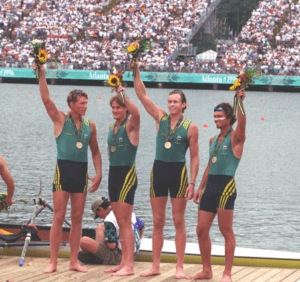The Teacher will arrive when the Student is ready to Learn.
By Bo Hanson – 4x Olympian, Coaching Consultant & Director of Athlete Assessments
“The Teacher will arrive when the Student is ready to Learn…” I read this quote after my competitive rowing career had finished. Maybe I would not have understood it had I seen it when I was rowing anyway. Looking back on my days as an elite athlete, I think of how differently I would have approached many situations. Hindsight is a wonderful thing. With experience and knowledge we can make better choices in how we behave. Of the things I would change, none of them relate to how I applied myself in terms of the effort I put in. I can look at myself in the mirror and honestly say, “I gave it everything I had to give.” Preparing for an Olympics demands nothing less than this.
What I would change is how I interacted with my crew mates. I considered myself a team player and an effective leader. There were still occasions though, where I struggled to “play and lead” effectively. There were times I struggled to communicate, understand and combine effectively with my crew mates. Looking back I would say, I had a personality clash with some of them. I thought I was “right” which meant they could only be “wrong”. My perspective was different to theirs.
When I started studying DISC behavioral profiling, I began to see where I was making some vital errors. These errors were in terms of how I communicated with my team mates, attempted to motivate them and generally built trusting relationships with them or not. I really did think that “my way”, that is, my behavioral style, if not the best way, was certainly pretty close to it. At the time, I did not appreciate how different we all were. It is in this difference that we all needed to understand how to change our behaviors in order to create a better team result. It is not about being the best person on the team. It is about being the best person for the team. This is a massive change in thinking.
In the 2000 season, we were training up to 16 times per week and spending more than 45 hours dedicated in some way to our Olympic preparation. For most of that season, we felt great pressure to succeed at our home Olympics. It was a Gold Medal only, any other result would be devastating. When in stressful times such as this, understanding the unique styles and needs of your team members becomes critical. Not understanding your team adds to the stress in the environment. Achieving high-performance can become impossible. I did not realize a lot of what I and my crew mates did in our behavioral styles, added to the stress enormously. For example, the reason I rowed was primarily to win. I was purely motivated by the result. I am a high “D”. This means, task -orientated and fast paced. Two of the other crew in my team were both high “I/S”. Their motivation was based around “relationships”. Of course they wanted to win, it is just that the relationships were a primary motivator. Being an “S” meant they were also slower-paced than me. This combination of different styles created conflict. Such as speed of decision making, time management, sensitivity to feedback and the list goes on.
There were actually times, when I thought the way my crew mates were behaving was specifically to frustrate me. This of course was never their intention. I know that now. But at the time in a stressful situation, when I missed that vital understanding of my team, well, you can see how things can be misinterpreted.
When I studied DISC, I realized there were some very obvious potential clashes within the different profiles. As a team, we just needed awareness and understanding in order to completely dissolve these issues. The teacher had finally turned up for me. I also realized what frustrated me in my crew members, were all the things that I personally lacked or unconsciously wanted to be more like myself. Such things as, more attention to detail to the precise boat set up. As well, a more free spirited approach to live each moment at a time instead of thinking about the future results and to enjoy the company of the great people around me. I missed a large part of the journey in 2000. When I rowed at the 2004 Olympics and won another Bronze medal, I truly appreciated what I was doing. I wanted to win and also enjoyed the process. I appreciated the people I was rowing with and enjoyed being in the crew. In short, I did not change who I was, I just changed what I did and it gave me better results. That is the power of this lesson. To be able to change what you do is only a behavioral challenge that every athlete must be able to understand.
Today, I have developed in all of these areas as I have spent a great deal of time and money investing in knowledge about myself and others. As we get older we aspire to be more well rounded individuals by becoming more self aware of our core values, strengths and limiting behaviors. This is a journey and like all other journeys it takes commitment and courage to look at one’s self and admit there are areas for improvement, then to actually do something about it. We are all a leader in some way. Few things are more inspiring than to see athletes improving themselves.
The Teacher will arrive when the Student is ready to Learn…
Discover more information about the AthleteDISC profile for athletes and CoachDISC profile for coaches. Or contact us to find out how we can help you further develop your coaching.






